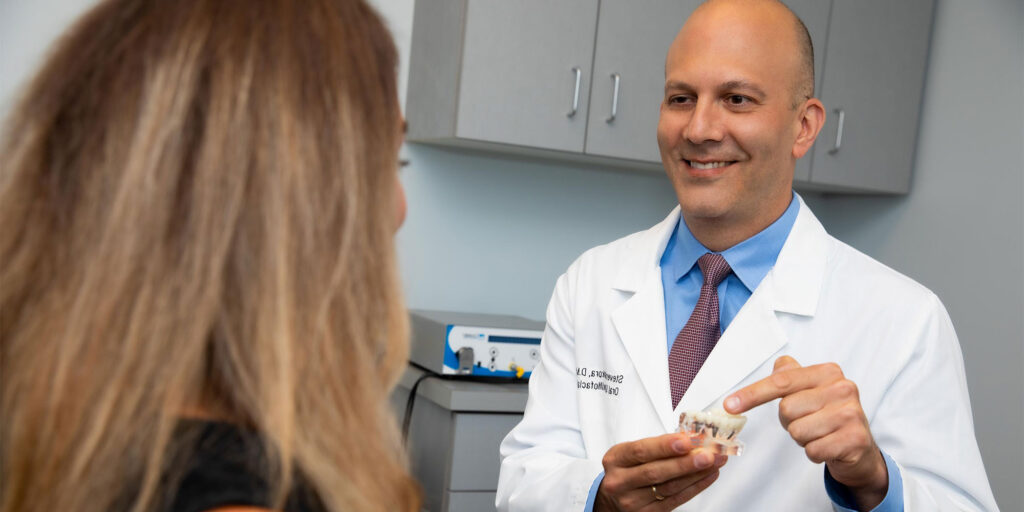
You’ve made the decision to get dental implants– congratulations! Dental implants are the most efficient teeth replacement option available, and our team couldn’t be more excited for you. This treatment will vastly improve your confidence and overall oral health.
However, you must follow Dr. Krakora’s instructions and guidelines after dental implant surgery. Most importantly, do not disturb the wound and avoid rinsing, spitting, or touching the surgical site on the day of surgery. There will be a metal healing abutment protruding through your gingival (gum) tissue that you don’t want to irritate.
Below are some additional instructions provided by our team, but please don’t hesitate to contact Dr. Krakora with any further questions.

You should begin taking pain medication as soon as you feel the local anesthetic wearing off.
Take 1 or 2 Tylenol or Extra Strength Tylenol every 3-4 hours, or you can also take Ibuprofen (Advil or Motrin) instead of Tylenol. Ibuprofen, when bought over the counter, comes in 200 mg tables. Therefore, take 2-3 tablets every 3-4 hours as needed for pain.
Take the prescribed medication as directed. Contact Dr. Krakora for any further questions.
Some bleeding or redness in your saliva is normal 24 hours after dental implant surgery.
Bite on a gauze pad for 30 minutes to control excess bleeding. Our office provides gauze pads in your post-operative bag.
If you find the bleeding continues, please call our office for further instructions.
Return to a normal diet as soon as possible unless otherwise directed.
Swelling is normal after dental implant surgery.
However, to minimize swelling, apply ice to your cheek over the area of surgery. Do this as frequently as possible for the first 36 hours.
You can use an ice bag, plastic bag, or towel filled with ice.
For some patients, antibiotics are prescribed before dental procedures to prevent infection. If you were prescribed antibiotics, be sure to take them as directed.
During dental procedures, bacteria from the mouth may enter the bloodstream. In most cases, the body’s immune system is able to fight off this bacteria with no problem. Therefore, the majority of people do not need to take preventative medicine.
However, people with certain heart conditions and orthopedic implants (if they have a weak immune system) are often prescribed antibiotics. The American Heart Association provides a guideline to those with heart conditions outlining who should be taking antibiotics.
Regardless of your situation, it’s best to talk to your doctor or oral surgeon so you can determine if you should be taking antibiotics.
On the night of surgery, use the prescribed Peridex Oral Rinse before bed. The day after surgery, the Peridex should be used twice daily, after breakfast and before bed.
Be sure to rinse for at least 30 seconds, then spit it out. Also, warm salt water rinses (teaspoon of salt in a cup of warm water) should be used at least 4-5 times a day, especially after meals.
Brushing your teeth and the healing abutments is no problem. Be gentle initially with brushing the surgical areas.
Keep physical activities to a minimum immediately following surgery.
If you are considering exercise, throbbing or bleeding may occur. If this occurs, you should stop exercising.
Keep in mind that you are probably not taking normal nourishment. As a result, this may weaken you and further limit your ability to exercise.
Partial dentures, flippers, or full dentures can be used immediately after surgery.
However, Dr. Krakora will discuss wearing your prosthesis in further detail during your consultation.
Request your consultation
I understand the information disclosed in this form may be subject to re-disclosure and may no longer be protected by HIPAA privacy regulations and the HITECH Act.
Schedule your consultation and experience it for yourself.
I understand the information disclosed in this form may be subject to re-disclosure and may no longer be protected by HIPAA privacy regulations and the HITECH Act.
We have always exceeded the strict OSHA-mandated protocols to maintain a highly sterile environment within our offices. These guidelines were created to safeguard against the spread of severely contagious diseases such as tuberculosis and measles, and they are equally effective in managing the spread of influenza and coronavirus.
In addition we have added more rigorous disinfecting techniques and sterilize common areas more often. Our office has added a sanitizing system directly to our HVAC which “cleans” the air continuously for an added safety measure. We have minimized contact with staff as much as possible by utilizing the internet and phone contact when possible, and have added the option for some to do a virtual visit.
Book Now
You have successfully subscribed to the newsletter
There was an error while trying to send your request. Please try again.
